Raising cats is an obligatory stage of their growth and development. Otherwise, the pet can grow aggressive, causing inconvenience to all households. Like a child, he requires attention, and in his absence, feels unnecessary, which manifests itself in anger and self-will. The material in this article will help the reader understand when and how to engage in the educational process with his pet.

Optimal age
A cat is considered a protected animal; under certain conditions, it quickly gets used to the rules established in a particular house. Her upbringing begins in early childhood, and the mother-cat begins to do this. From birth to two months of age, kittens under the care of a cat learn to build relationships and communicate with each other. This is how basic socialization proceeds.
Kittens are taken from a cat in about 2 months. By this time, they are already going through the first basics of communication, resolving conflict situations, gaining tactics of behavior. Around this time, you can start raising pets.
The first thing will be to reduce the level of stress associated with excommunication and moving to a new home.


Breeders give other kittens only in three months, accompanied by documentation that includes a veterinary certificate and a pedigree. Typically, these babies are already accustomed to the tray and vaccinated. After the pet has more or less departed from parting with his mother, you can begin to educate him. Particular importance should be given to its security and the creation of borders.
By four months, the baby will understand the diet, will understand the time of wakefulness. If you miss this moment, raising a gentle and calm pet will be more difficult. If from day to day to shift the procedure of education, you can wait for the fact that in six months the pet will begin to mark the territory.
It’s not difficult to understand that the baby is ready: as soon as he stops yearning for his mother, it’s time to act.


rules
Do not indulge all the vagaries of the pet, so as not to raise a naughty cat or an uncontrollable cat. In any home, there should be rules ranging from feeding to personal space. Do not let the pet aggressive games, scratching, biting the owners. You can not ignore the animal, because in itself it will not become smart and educated.
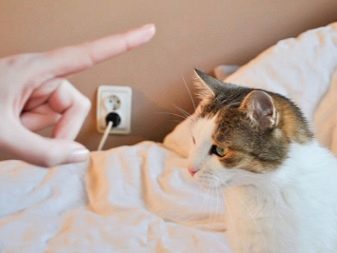

Within six months after the kitten is brought home, it is important to create a calm environment for him so that he can relax and feel safe. Stressful situations are excluded in the form of:
- noisy gatherings in the company of friends;
- loud music, and especially metal or rock;
- home walks on a leash;
- screaming, sudden movements, aggression in the tone of voice;
- gaze, touching the base of the tail and stomach;
- punishments that offend the animal.

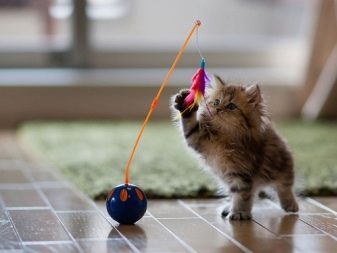
You should take note of 10 basic rules.
- Food time is sacred: it is necessary to withstand certain hours and frequency of feeding.
- You can never scare a kitten, and an adult cat during sleep.
- You cannot start aggressive games with a kitten, deliberately anger it or forcefully hold it by its tail or paws.
- You can not scream at the pet, because he very well understands the intonation of the owner.
- From the first day it is important to equip a kitten with its own space. He should have his own bed and toys. He should not sleep in the master’s bed.
- Every day you need to talk with your pet, pet it, caress it. However, you can not climb to the baby with his love, if he is busy with something.
- You can not scream at the baby when bathing, even if he is very scared and scratched. You can not deliberately scare him with the loud noise of the included vacuum cleaner.
- You can’t beat an animal, forcing it to stand or sit according to your desire.
- It is important to ensure that the cat has access to its tray, bench and bowl.
- In addition to food, the pet should always have a bowl of water, he should not look for water himself in the sink, toilet or sink.


It is important in the first month after the kitten adapts to new conditions, to begin hygiene of the ears, hair and eyes. This should become a habit, as is going to the veterinarian for preventive examinations.
If from early childhood to teach a baby not to be afraid of anything, he will behave calmly and friendly.
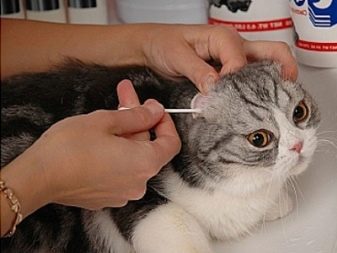
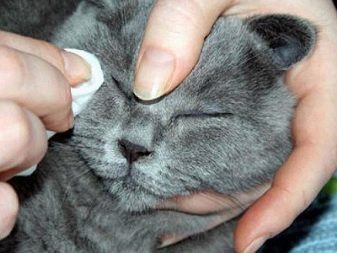
How to teach to the tray?
It is not uncommon for kittens to be held in their hands when they need to use the toilet. Situations end in minor troubles. At the same time, the kids feel uncomfortable and in the future try to hide from intrusive households. It’s easy to train a kitten to a tray at home. As soon as the baby begins to fuss and hiccup the toilet, it is necessary to transfer it to the tray.
To make the kitten more understandable, you can pick up a tray that is similar to the one that was in the nursery by purchasing a similar filler. As a rule, small kittens go to the toilet about 15-20 minutes after eating. This is the best time to follow them.
If suddenly the baby did not have time to find his tray, trouble happened, do not poke his nose or scold.


Such host behavior will scare the animal. The kid will think that you can’t do this in the house. And since he cannot endure forever, he will hide. A puddle or excrement should be collected with a napkin and placed in a tray. After this, the kitten itself should be placed in the tray with its paws, so that it smells and understands where the latrine is.
The place where the "surprise" took place, Rinse thoroughly and treat with Antigadin. If this is not done, repeated troubles can be expected there.First, the tray is placed near the baby. As it grows and better develops the house, the tray is pushed back to a permanent place.
You can and should tell your pet that he did badly, because cats understand intonation very well.
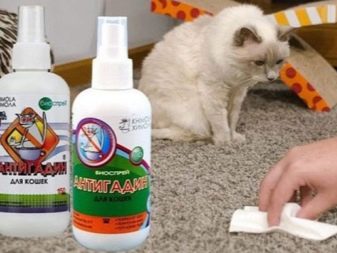

Scratching point training
Surely many are familiar with the situation when cats destroy not only the upholstery of upholstered furniture with their claws, but also wallpaper and even clothing. To prevent this, it is necessary to purchase a special kit called a claw-tip for a small kitten. You don’t need to grab a kitten and scratch its paws on the device: it is often enough to play nearby, and for this, a clawhole can be part of the game complex. The kitten should be in the kitten by 5-6 months.
In order to prevent the rooting of a bad habit, you can buy several devices by installing them at the front door and in places where the kitten spends most of his wakefulness.
To attract attention, you can treat them with sprays with the scent of valerian or mint. Cats, as a rule, are not indifferent to these plants.

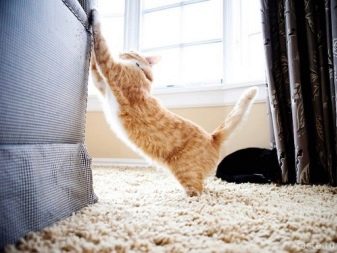
Communication and food
Pay attention to the kitten, and an adult cat needs every day. It can be joint walks in the fresh air, games, conversations. As a rule, individuals deprived of human affection snort and hiss more often than others. Self-confident animals are calm. You can take the baby in his arms when he allows it, but rarely do it categorically.
If the baby is sleeping, you can not touch him: this deprives the cat of a sense of security in his own bed. Therefore, he will hide in order to rest calmly. In order for the kitten to grow affectionate, communication with him should be similar. This is a baby-like care, feeding, restful sleep and active games, rewards in exploring the world and no stressful situations.
In addition, nutrition also affects his condition. In order to prevent anxiety, you need to properly feed the baby, choosing a nutritious diet based on his age. In addition to industrial feed, it should also have natural food, and fresh.
The behavior will largely depend on whether the cat's body is enough to receive vitamins and nutrients.


Is it possible to beat a kitten?
Under no circumstances should an animal be beaten for educational purposes, no matter what its age. This leads to his bitterness, and sometimes revenge. Never force methods will not lead to the fact that the animal will become obedient and affectionate. A small kitten will grow shy and nervous, he will be afraid of his master.
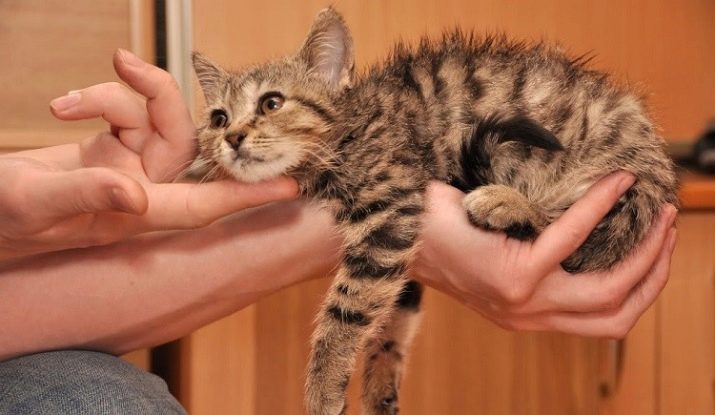
How to re-educate an adult cat?
It will not work to get good behavior from a cat with bad behavior. The tone of communication with a delinquent and naughty animal can be strict, but not irritated or aggressive.


We note several basic problems and methods for solving them.
- To prevent the cat from biting during the game, you can stick your bitten finger a little deeper. The animal will well remember the uncomfortable sensations and quickly understand that this is not necessary to repeat.
- If the cat is constantly upsetting something, put coins in these containers. When the container falls, there will be a loud sound that pets do not like, a couple of times the cat will be enough to not climb into this place.
- Cats don’t beat dishes especially during wild races. Like a cat-mother, you can, but not for long, scold the cat by touching the tip of his nose (this is how the cat-mother “scolds” the kids).
- Do not scold the cat for a whole week for any offense. He quickly forgets what. You can't go screaming.
- To prevent the cat from jumping where it is impossible, stick some sticky tape to these places for some time. She really does not like it, besides she remembers places where to conquer the "top of the house" is not worth it.
- If a cat steals food, it's your fault. Clean it immediately after a meal, wash the dishes, hide the leftovers in the refrigerator. You need to feed the cat before your meal.
- To prevent the cat from jumping over your clothes, generously endowing them with their hair, use sprays based on herbal ingredients. Cats do not like many smells and do not climb where they come from.
- If the animal is not indifferent to houseplants and overturns them together with the ground, it is worth diluting black pepper in water and sprinkling a plant on it.
- For good behavior, you can reward your pet with snacks or praise.
- So that the cat does not crap in the house in the wrong places, it should not be manual. In addition, children should not be allowed to hurt him, animals should not be tormented.


Possible difficulties
Cats understand the degree of closeness of a relationship. So that the animal does not feel lonely and useless to anyone, since childhood it is necessary to play with him, finding for this 15 minutes in the morning and in the evening. In this case, it is advisable to ensure that the time of the game every day passes at the same time. This will teach the kitten a certain mode when he can ask for attention.
You can not play with the animal using, instead of toys, hands or feet. You can’t tease an animal, considering it harmless games: it is precisely these “methods of education” that turn a good and smart kitten into an evil and aggressive one. You can neither pull on the hair nor pinch it: it causes pain, and therefore the animal can respond in the same way.
If the game becomes aggressive, it must be stopped by moving the pet to another room and allowing him to calm down. If it does not immediately reach him, then over time this measure will work. You can not let the cat consider that such behavior is worthy of a reward and at least some attention. Take your pet to another room and make a remark in a strict voice.


When cats are not indifferent to curtains (for example, spoil them, gnaw and tear their claws), you can try to sprinkle pets with water from a small spray bottle. This helps other individuals: henceforth, they try not to repeat this. If the animal made it a rule to mark the territory, the place of the tags should be treated with a solution of essential oil with citrus. In most cases, this fights off a similar hunt.
There are times when the cat does not recognize the authority of the owner. This is explained by the fact that from childhood the baby slept with a person in the same bed. It is in bed that a large concentration of odor accumulates, and therefore, from childhood, a kitten considers itself equal to its owner. With age, he may consider himself the dominant member of the family or its leader. Re-educating such cats is difficult, and sometimes even impossible.
So that he does not crap in different places, the tray needs to be cleaned every time as soon as the animal visits it (it is especially important to immediately get rid of excrement). You can’t move the cat with your foot if it spins side by side, you can not scold him for what he is not to blame. Never the cause of a cry should be the host’s bad mood. Teach the cat care, and over time, he will learn to feel sorry for you, purring next and calming the friction of the face on the cheek or hands.


You can find out how to wean a cat to tear off a sofa and wallpapers by watching the video a little lower.


































